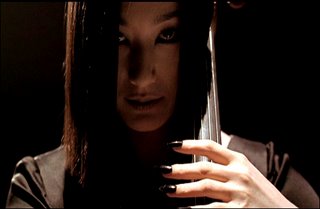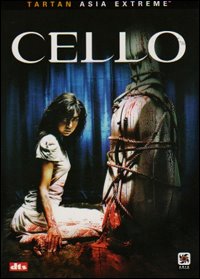when an "important" concert is approaching.
Sunday afternoon, I'm performing (for my first time) the Shostakovich 1st Cello Concerto, with the DePauw Symphony, here where I teach. My "real" cello, a wonderful 1790 Pietro Pallotta, is being restored by Russell Wagner in Chicago, and looks something like this.
I have never had a permanent second cello. DePauw owns a terrific Luis and Clark carbon-fiber cello, which projects well and which I've played in a number of concerts over the last 18 months or so. I'm also in the process of starting a business selling instruments, and have two cellos by Jan Szlachtowski, a good contemporay maker. These instruments sell in the $12,000-14,000 range, and are some of the best, perhaps the best I've heard in that range. I've used one of them in a number of chamber music concerts and recitals, with wonderful feedback.
They don't project as well, though, as the Luis and Clark. Very few if any wood cellos do; a friend brought his Nicolo Gagliano along on a visit last spring, and the L&C carried even better in a hall than that cello. But the tone of the L&C is not as rich or warm a tone.
A student of mine is trying a Gary Garavaglia cello (Gary's a contemporary maker in Chicago) which I love. About twice the price of the Szlachtowskis, it is richer and projects better. But as with the Gagliano, it doesn't project as well as the L&C. And the Shostakovich is the sort of piece in which one needs all the projection one can get, especially playing with a young undergraduate orchestra, not all of whom are music majors. One of my former teachers told me it was easier to be heard when soloing with the entire Berlin Philharmonic or Philadephia orchestra than with a student or amateur chamber orchestra. Professional orchestra players play so well that they aren't focused on just playing their parts, so they truly listen to the soloist, and won't cover her or him up (unless there's some soret of vendetta going on!).
The Garavaglia I find incredibly easy to play; it's as if it had been made for me. And the dealer would be delighted, of course, if I play it Sunday. The Garavaglia could be a good middle ground. And I won't have certain traditionalists fussing at me for using a carbon-fiber
thing." (Actually, that's kind of a reason to use the L&C!) So I'm still going back and forth. Since today is Wednesday, I really need to make up my mind.
This indecisiveness is a bit crazy, I know. It seems clear to me that it's a symptom of anxiety about the concert. It's one local concert . . . who cares which cello I use? But here I am, making an enormous issue about it. (Once I spent the entire day of a recital shopping for a new pair of patent leather shoes, for which I ended up overpaying and only wore a couple of times, since they turned out to be uncomfortable.)
I'll try them both with the orchestra this afternoon, with a friend or two in the hall and also recording the rehearsal with a mic in the middle of the hall. I'll use that feedback to make a final decision TONIGHT (you hear that, Eric? Tonight!).
Well, maybe it's a good sign that I'm obessing over which cello to use. It means I'm comfortable about the piece itself!



